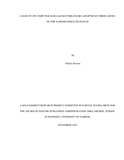| dc.description.abstract | Continuous provision of computing services is of crucial concern to organizations that rely on
computer based information systems. Organizations incur costs when computer based information
system breakdown and as such they should ensure reliable backup strategies are implemented to
cushion against potential loses.
The objectives of the survey were to establish the backup strategies adopted by firms listed in the
Nairobi Stock Exchange (NSE), to determine the factors firms consider when selecting an
appropriate backup strategy and to establish the challenges faced in implementing backup strategies.
The survey used a descriptive survey research design and was based on all the 46 firms listed on the NSE as at October 2009. A structured questionnaire with both open and closed questions was the key instrument for primary data collection. The questionnaire was administered to the Information Communication Technology (ICT) staff of the firms. A response rate of 89% was achieved with 41 out of the 46 questionnaires replying to the questionnaire. The data collected was checked for errors and completeness and then analyzed using statistical measures of mean, proportions and standard deviations.
The research found that the firms surveyed had identified the critical computer data within their
organizations and performed regular computer data backups. 95% of the firms contacted had a well
established data backup policy. Most firms had documented their data backup procedures to guide
the backup processes. Organizations reported backing up computer data on either a daily, weekly or
on a continuous basis. The survey found that network based backup methods were widely used among the organizations surveyed. Tests for recoverability of backup data were undertaken on a
monthly basis for most of the firms surveyed. On the factors the firms considered when selecting
backup strategies the survey showed that the reliability of the backup medium, ease of use of
particular backup medium, the volume of data an organization and the impact of systems
unavailability to a business were the key factors that influenced the choice of a data backup strategy.
The surveyed firms reported the volume of data to be backed up, requirements for data
confidentiality, and time taken for backup operations to complete as the main challenges they faced
when implementing data backup strategies. Other challenges reported included systems’ down-times while backups are run, the amount of time available for backup tasks , the existence of critical data in different locations, different formats and in different operating systems environment
The survey concluded that the firms placed a high importance on computer data backups with this
responsibility being undertaken by the ICT staff in most of the firms. Although the magnetic tape
was still popular, majority of the firms surveyed had adopted network based backup methods.
Reliability and ease of use of backup media were key factors considered by the firms in selecting
particular backup strategies. The cost of the backup strategy was not a key consideration factor of
the backup strategy to adopt. Large data volumes and the time data backup operations take to
complete were the main challenges faced when implementing data backup strategies. | en |

